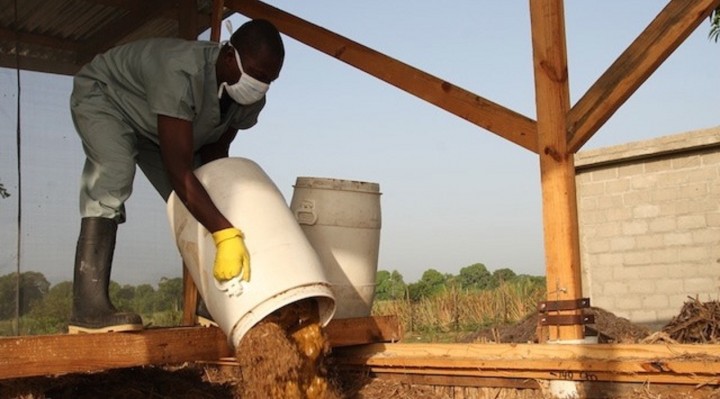SOIL Research Projects
Project ongoing since: 2009 • SOIL (Sustainable Organic Integrated Livelihoods)
Purpose
To provide public, shared, and private household UDDTs, and collects the waste for processing into agricultural-grade compost. Research activities focus on private-sector solutions to providing sanitation services.
Activities
Since building Haiti’s first ecological sanitation (EcoSan) toilet in 2006 and Haiti’s first urban waste treatment facility in 2009, SOIL has gone on to become one of the largest sanitation providers in Haiti. SOIL provides public, shared, and private household UDDTs, and collects the waste for processing into agricultural-grade compost. Current research activities are focused on demonstrating the potential for a private-sector solution to providing sanitation services in impoverished communities and include best practices in EcoSan, thermophilic composting, and agricultural uses of compost. SOIL's full list of papers, conference presentations, and other resources are available here.
Sample projects include:
- Ecological sanitation in emergency contexts
- DNA Extraction from compost
- Market analysis for EcoSan compost
Images

Image: Soil waste transformation © soil
Countries of activity
Location of main activity
Further information
SOIL collaborates with many universities, for example with Stanford University on this grant:
"Mobile Sanitation Services for Dense Urban Slums - project re.source"
Contact information
Sasha Kramer
Login to see the e-mail-adress of the contact person.
Filter tags
Community sanitation Composting, vermicomposting (solid waste), composting toilets Container based systems (CBS) Emptying and transport (non sewered) Faeces or faecal sludge Fertiliser Food security and productive sanitation Latin America & Caribbean Local NGO Operation, maintenance and sustainable services Other funding source or unspecified Practitioners Resource recovery Specific to one or several countries Toilets or urinals (user interface) Treatment of wastewater or greywater Urban informal settlements (slums) Urine diversion dehydration toilets (UDDTs)
Links
Sustainable Organic Integrated Livelihoods
Port-au-Prince
Haiti
Uploaded by:
SuSanA Admin (susanaadmin)
















